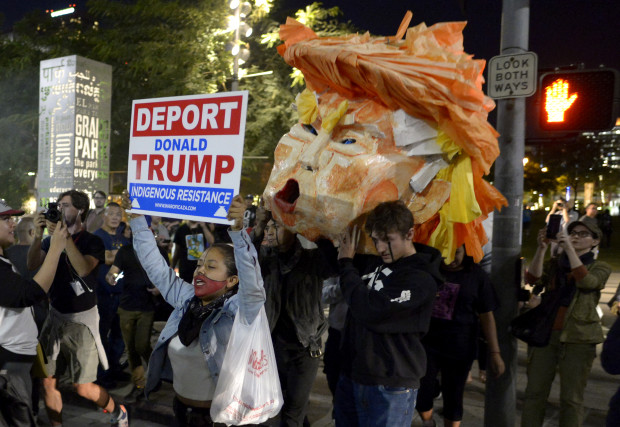
Protesters carry a paper head of President-elect Donald Trump during a protest in front of City Hall Wednesday, Nov. 9, 2016 in Los Angeles. A day after Trumps election as president, the divisions he exposed only showed signs of widening as many thousands of protesters flooded streets across the country to condemn him. AP
NEW YORK, United States — Thousands of Americans descended on Trump Tower Saturday in a fourth day of protests against Donald Trump as the president-elect — huddled inside his Manhattan residence with advisers — kept the world guessing about his next moves.
The Republican billionaire has sought to strike a conciliatory tone since his election sent a shockwave around the world, announcing Friday he no longer intended to completely scrap Barack Obama’s signature healthcare law, Obamacare.
“This will prove to be a great time in the lives of ALL Americans. We will unite and we will win, win, win!” he tweeted Saturday, as more than 3,500 people marched toward Trump Tower amid cries of “Trump is NOT my president” and “New York hates you.”
READ: Anti-Trump protesters march amid tear gas, flash grenades
In Los Angeles, police made several hundred arrests as they dispersed protesters who had gathered in the city’s Grand Park. The police action came after an estimated 3,000 protesters marched through downtown carrying signs that read “Not My President” and “Election Outrage.”
Thousands more marched peacefully in Chicago.
Trump Tower has been the epicenter of a furious round of activity as the Trump team fleshes out his cabinet picks and works to fill hundreds of other top government jobs.
Among those seen entering the tower Saturday were Nigel Farage, whose UK Independence Party backed the Brexit vote that stunned Britons just as Trump’s victory did many Americans. Farage said he was there only as “a tourist.”
Also entering the building was the provocative documentary filmmaker Michael Moore — whose impromptu effort to meet with Trump was blocked by Secret Service agents.
Marion Marechal-Le Pen, a rising star in France’s far-right National Front and niece to its leader, Marine Le Pen, said Saturday she had contacted the Trump team about working with them.
Although Trump’s election has set off alarm bells in many world capitals, it has been warmly welcomed by Europe’s surging far-right movements.
How he’ll govern
Around the world, Trump’s every move is being scrutinized for clues to how the political novice will govern.
His U-turn on Obamacare — which candidate Trump had branded a “disaster” — was prompted by his White House meeting with the outgoing president a day earlier.
In his first post-election interview, Trump told The Wall Street Journal he may maintain a ban on insurance companies denying coverage because of so-called pre-existing health conditions. He also said he may continue to ensure that young people can remain on their parents’ policies until the age of 26, a key Obamacare tenet.
“I like those very much,” the 70-year-old real estate mogul said of both points.
It marked one of several moves by Trump and his advisers away from his more sweeping campaign positions.
Asked by The Wall Street Journal whether he would, as threatened, name a special prosecutor to investigate his opponent Hillary Clinton over her use of a private email server as secretary of state, Trump deflected.
“It’s not something I’ve given a lot of thought, because I want to solve health care, jobs, border control, tax reform,” he said. Not long ago Trump was leading crowds in chants of “Lock her up!”
Trump surrogate Newt Gingrich also cast doubt on whether Trump would make Mexico fund his proposed border wall — another rallying cry.
“He’ll spend a lot of time controlling the border. He may not spend very much time trying to get Mexico to pay for it, but it was a great campaign device,” Gingrich was reported as saying by The Washington Post.
‘A country that loves’
Despite his more measured tone, the Republican has yet to respond to mounting calls to reassure Americans who fear a xenophobic crackdown under his authority.
The Southern Poverty Law Center (SPLC), which monitors hate groups, tracked more than 200 incidents of election-related harassment and intimidation in the three days following the election.
More than 47,000 people have signed an SPLC petition urging Trump to clearly distance himself from “haters” — from white nationalists to anti-Muslim and anti-gay extremists — who are celebrating his victory.
Asked by The Wall Street Journal whether he thought his rhetoric had gone too far, Trump responded: “No. I won.”
But he added that he would now take a more positive approach.
“I want a country that loves each other,” he said, arguing that the way to ease tension would be to “bring in jobs.”
In a CBS interview to be aired on Sunday, Trump spoke warmly of the election night call he received from Hillary Clinton conceding his victory.
“It was a lovely call, and it was a tough call for her,” he said, according to interview excerpts. He praised Clinton as “very strong and very smart.” CBB/rga
RELATED VIDEO